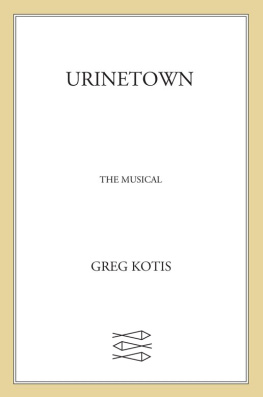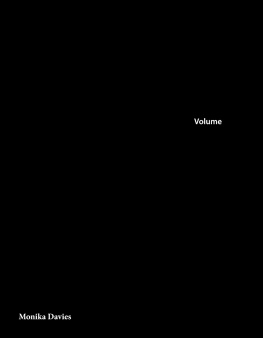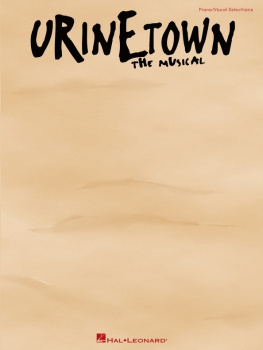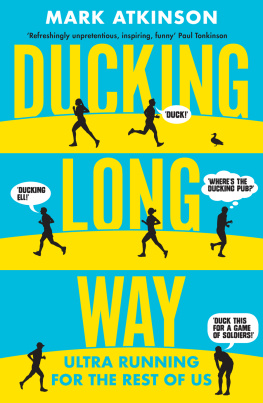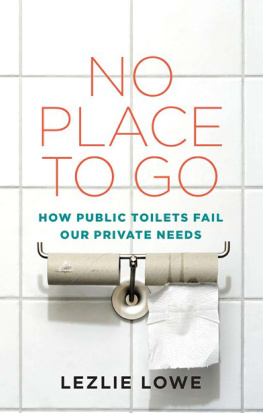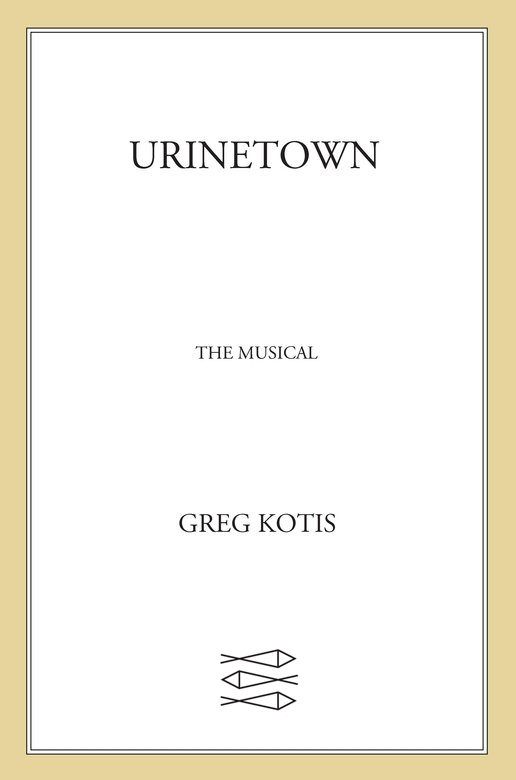In the moments before the Tony broadcast began, a man strolled onstage to read the bejeweled and/or black-tied nominees the riot act. Winners would be allowed one minute from the moment their names were announced to say their piece. Should they be fortunate enough to be invited to do so, winners should make their way quickly to the stage, not thank their babysitter, and get off the stage before the get off the stage music started. I heard rumors to this effect in the days leading up to the event and had written a thank-you speech that morning just in case. Read at a comfortable pace, it came in at fifty-eight seconds. Given more time, I would have thanked all the people whose efforts made Urinetown possible, including those listed below; to see their names is to know how truly collaborative the making of a musical must be:
Our genius-like, incomparable, stupendous, original Broadway /Off-Broadway cast, including David Beach, Bill Buell, Dwayne Clark, Jennifer Cody, Rachell Coloff, Rick Crom, John Cullum, John Deyle, Hunter Foster, Victor W Hawks, Erin Hill, Ken Jennings, Spencer Kayden, Megan Lawrence, Stacie Morgain Lewis, Daniel Marcus, Jeff McCarthy, Nancy Opel, Michele Ragusa, Peter Reardon, Don Richard, Lawrence E. Street, Jennifer Laura Thompson, Kay Walbye, and Kirsten Wyatt, all brought together by the casting directors Laura Stanczyk, Jay Binder, and Cindi Rush.
Our steady and extraordinary Broadway/Off-Broadway musicians, including Ed Goldschneider, Paul Garment, Ben Herrington, Tim McLafferty, and Dick Sarpola, all brought together by the music coordinator John Miller.
Our supremely fabulous stage managers, theater managers, and crew, including Julia P. Jones, Matthew Lacey, Joseph R. Bowerman, Sally Campbell Morse, Robert C. Strickstein, Marc Borsak, J. Anthony Magner, Kai Brothers, Susan Bell, Tech Production Services Inc., Joseph Maher, Paul and Andrew Dean, Valarie LaMourt, Elspeth Appleby, Shannon Koger, Megan Rhoads, Lucas Stoffel, George Amores, Mary Mulligan, Todd McKim, William Register, Bobby Driggers, and Dean Gardner.
Our magnificent and many-handed creative team, including John Rando, John Carrafa, Edward Strauss, Bruce Coughlin, Scott Pask, the late, great Jonathan Bixby, Gregory Gale, Brian MacDevitt, Jeff Curtis, Lew Meade, Rick Sordelet, Darlene Dannenfelser, David Kennedy, Jeannine Sabo, Michele Lynch, Orit Jacoby Carroll, Michele Wynne, Gretchen Krich, Yael Lubetzky, and Charles Vorce.
Our visionary, pathfinding, fear-destroying producing team, including Michael David, Lauren Mitchell, Edward Strong, and everyone at Dodger Theatricals, Dodger Marketing, and the Dodger Management Group; TheaterDreams, Inc.; and Michael Rego, Matthew Rego, Hank Unger, Clint Bond, Jr., Aaron Harnick, Jimmy Pellechi, Taylor McGowan, and everyone at the Araca Group.
Our expert and professional boosters of every stripe, including Adrian Bryan-Brown, Jim Byk, Bill Craver, Ben Feldman, Martine Sainvil, Mark Stevenson, and the fine people of Serino Coyne.
Our snowbound yet indomitable January 2000 staged reading crew, including James Barbour, Nancy Opel, Marcus Lovett, Spencer Kayden, Jennifer Laura Thompson, Brooks Ashmanskas, Dale Hensley, Nanci Gaye Bradshaw, Christopher Murney, Tom Gualtieri, Jessica Frankel, Debra Wiseman, Raquel Hecker, Duane Martin Foster, Michael St. John, and Daniel Marcus, all brought together by the casting director Cindi Rush.
Our heroic, utterly unforgettable cast, crew, and creative team from the 1999 New York International Fringe Festival production, including Jay Rhoderick, Spencer Kayden, Wilson Hall, Louise Rozett, Adam Grant, Carol Hickey, Victor Khodadad, Rob Maitner, Terry Cosentino, Nick Balaban, Kristen Anderson, Bellavia Mauro, Zachary Lasher, Allison Schubert, Raquel Hecker, Joseph P. McDonnell, Wylie Goodman, Karen Flood, Michael Stuart, Peggotty Roecker, and Jane Charlotte Jones.
The gratitude-inducing forces behind the New York International Fringe Festival, including John Clancy and Elena K. Holy.
The prescient collection of actors and theater practitioners who first perused the script, sang the songs, and read the lines, all in the name of improving the material, including Andy Cook, Steven Singer, Nannette Deasy, Debra Wassum, Eric Carrillo, Jim Andralis, Raven Snook, Ian W Hill, Adrienne Asterita, Dann B. Black, Heidi Godt, Alana Israelson, Dan Perry, Marcus Woollen, David Auburn, Scott Hermes, Bob Fisher, Tommy Moore, Stan Schwartz, Diana Slickman, Greg Allen, Robert Stockfish, Bill and Rob Coelius, and Sean Bosker.
Pastor Brooke Swertfager and the congregation of Christ Lutheran Church in Manhattan.
Co-workers past and present, including the good people of the Neo-Futurists, and the really very good people of the Cardiff Giant Theater Company.
And, ultimately, our own community of friends and family members who have made this life of writing plays possible, including Paula Kotis, Sam Kotis, Juanita and Ray Hollmann, Jilly Perlberger, and, finally, Ayun Halliday, who made us keep going even when we didnt want to.
Thank you.
GREG KOTIS AND MARK HOLLMANN
Early morning. The poorest, filthiest urinal in town. Above the entrance to the urinal hangs a sign that reads Public Amenity #9. THE POOR lie sprawled across the stage, sleeping quietly. Music for Urinetown plays softly in the background. OFFICER LOCKSTOCK enters from the house, inspecting the theater for orderliness. Satisfied, he takes his place onstage and addresses the audience directly.
LOCKSTOCK: Well, hello there. And welcometo Urinetown ! (Pause.) Not the place, of course. The musical. Urinetown the place is well, its a place youll hear people referring to a lot throughout the show.
(PENELOPE PENNYWISE and BOBBY STRONG enter. They carry with them a small table upon which rests a ledger.)
PENNY: You hear the news? They carted Old So-and-So off to Urinetown the other day.
BOBBY: Is that so? What he do?
PENNY: Oh, such-and-such, I hear.
BOBBY: Well, what do you know? Old So-and-So.
(Bobby and Penny set up their workstation, placing the table beside the entrance to the amenity as THE POOR begin to rise.)
LOCKSTOCK: Its kind of a mythical place, you understand. A bad place. A place you wont see until Act Two. And then ? Well, lets just say its filled with symbolism and things like that.
( THE POOR sing the Urinetown theme on an ooh ever so softly as they prepare for another day. LITTLE SALLY enters, counting her pennies.)
LOCKSTOCK: But Urinetown the musical, well, here we are. Welcome. It takes place in a town like any town that you might find in a musical. This heres the first setting for the show. As the sign says, its a public amenity, meaning public toilet. These people have been waiting for hours to get in; its the only amenity they can afford to get into.
( LITTLE SALLY approaches LOCKSTOCK. )
LITTLE SALLY: Say, Officer Lockstock, is this where you tell the audience about the water shortage?
LOCKSTOCK: Whats that, Little Sally?
LITTLE SALLY: You know, the water shortage. The hard times. The drought. A shortage so awful that private toilets eventually became unthinkable. A premise so absurd that
LOCKSTOCK: Whoa there, Little Sally. Not all at once. Theyll hear more about the water shortage in the next scene.
LITTLE SALLY: Oh. I guess you dont want to overload them with too much exposition, huh?
LOCKSTOCK: Everything in its time, Little Sally. Youre too young to understand it now, but nothing can kill a show like too much exposition.

